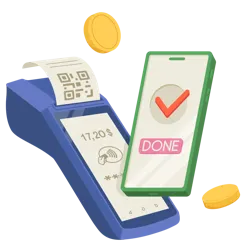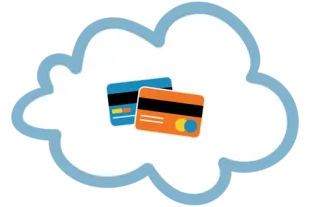There are plenty of options when selecting a point-of-sale (POS) system for your business. Knowing what to look for is essential.
Choosing the right solution—be it Clover, Toast, or another popular POS alternative—can help you reduce business costs, improve operational efficiency, and drive sales. Still, the question remains: how do you know which option makes the most sense for your business?
Today, we’ll compare two of the most popular and recognizable POS systems mentioned above: Clover and Toast. We’ll determine which platform best suits your needs, focusing on hardware, pricing, features, and congruity with different business types. Read on to learn more!
Clover Vs Toast POS at a Glance
Clover and Toast are reputable, widely used point-of-sale systems with singular benefits tailored to various industry scenarios.
From eCommerce and professional services to restaurants and home businesses, Clover POS offers designated packages that help business owners streamline and simplify their operations. Clover’s all-in-one solution provides user-friendly software and hardware options designed to help with payment processing. In addition, Clover comes packed with features built to help users organize inventory, monitor sales, and tend to managerial tasks.
While Clover’s design makes it a versatile tool fit for any number of contemporary industries if you’re in the food and beverage (F&B) world, know this: Toast was explicitly designed with you in mind. As a platform, Toast assists restaurants and dining establishments with both long-term management and daily operations. With Toast, food and beverage merchants can track inventory, accept payments, manage staff, and maintain orders in one place.
Clover vs Toast Comparison: Key Features and Functionalities
The primary difference between Clover and Toast is the focus of their POS features. While Clover aims to offer a user-friendly all-in-one solution, Toast focuses on providing specialized tools to optimize operations in the restaurant space.

Clover POS: Leveraging the Power of Versatile Point-of-Sale Solutions
Clover’s all-in-one service provides everything you need to get going, including hardware, software, and options to process payments online and in person. The system lets you accept an assortment of payment methods, including:
- Credit cards
- Debit cards
- PayPal
- Venmo
- Apple Pay
- Google Pay
- Cash
- Checks
Clover’s system is designed to integrate reporting tools that help the user track sales and employee performance metrics. Its rapid deposit feature allows for fast payment access, and users can set up neat options like loyalty programs and physical and digital gift cards.
Clover lets you manage the entirety of your business under one platform. Users can do this via inventory management, eCommerce support, staff management, and basic restaurant features, such as QR code ordering and menu management. This holds true for both new and used Clover devices.
The platform offers access to hundreds of applications and add-ons, including accounting tools, appointment scheduling, and various marketing features. The goal is to extend Clover’s capabilities to meet your business needs.

Toast POS: Streamlining Restaurant Operations with Specialized Tools
Much like Clover, Toast’s restaurant-focused service provides both hardware and software, as well as online and in-person payment processing. The expansive nature of the platform’s reporting is impressive, as it enables users to stay up-to-the-minute with inventory, labor, and real-time sales. Toast users can gain substantial insights into their business and thus make decisions through custom reports. The platform also comes with a mobile ordering and checkout feature. Utilizing this facet of Toast, users can take orders and process payments at the customer’s table. They are also capable of placing online orders and tracking meal delivery.
The features included in Toast’s menu update allow users to make adjustments on the fly. Toast is also noteworthy in that it makes tracking ingredients and prices relatively simple, which helps keep establishment costs in check. For those seeking assistance, Toast clients receive round-the-clock, 24-hour support.
Clover vs Toast POS Hardware Options
Toast and Clover offer hardware options, each tailored to different business scenarios.

Clover POS Hardware: Robust Devices for Seamless In-Store Transactions
Clover provides payment hardware devices for businesses of all sizes and types, available in bundles with software packages.
Their most cost-effective device, Clover Go, accepts contactless, magstripe, and EMV chip payments—making it a natural fit for mobile workers, home businesses, and market vendors.
The Clover Flex, meanwhile, is a comprehensive handheld device offering payment processing, customer signatures, barcode scanning, and receipt printing features.
The tablet-size Clover Mini may be just what you’re looking for in terms of basic checkout stations. It processes payments, prints receipts, scans barcodes, and—unlike the offerings mentioned above—accepts EBT payments.
For a more sophisticated alternative, the Clover Station Solo has a 14-inch touchscreen and comes outfitted with a camera, receipt printer, cash drawer, barcode scanner, and even a fingerprint-scanning feature.

Toast Products: Tailored Hardware Solutions for the Food & Beverage Industry
Toast’s hardware solutions are bundled according to the user’s budget and business needs. The provider offers POS terminals, scanners, sales tablets, card readers, and Toast Tap, which allows patrons to pay via digital wallet. Toast hardware includes point-of-sale accessories like routers, cash drawers, scales, bar printers, and kitchen display screens.
For users who are just getting started, Toast allows you to set up everything you need for your food-and-beverage-based POS system. Begin with the standard-issue setup and expand in alignment with your budget and evolving professional needs.
Clover vs Toast Pricing: Comparing Costs and Add-Ons

Clover and Toast leave something to be desired regarding transparent pricing. Both platforms specialize in tailoring custom solutions for hardware and payment processing costs, which can vary in price.
Clover offers an assortment of payment and package options specifically designed for different business types. While pricing varies according to business type, each industry offering is generally represented at all tiers.
For example, a retail business Starter Plan begins at $14.95 per month and can go up to $175 monthly for the Advanced Plan. The monthly fee will depend on:
- The hardware items you need.
- The features included in your package.
- The size of your business and scope of annual sales.
- Whether you purchase or lease hardware.
- Add-ons such as paid app integrations.
Toast offers plans ranging up to $165 per month. Plans and pricing are generally customized to fit each business’s needs. Toast sets itself apart with a new free plan—the Quick Start Bundle—that only charges businesses for payment processing. While the plan’s features are limited, it remains a worthwhile option for operations like food trucks and single-location coffee shops.
Toast Now is that platform’s digital ordering solution. Toast users can order online and manage marketing and delivery services through Toast Now. Users who use a different point-of-sale provider for in-person sales can still use Toast Now for online orders. Monthly rates start at $75 and go up to $175 for the premium plan.

Clover vs Toast: Assessing Fees, Subscriptions, and Optional Features
Unlike Clover, you must use Toast as your payment processor to utilize its software for various POS solutions.
Toast’s website does not detail the ins and outs of processing fees. The reason for this will depend on your establishment’s model: for instance, whether it’s a mobile food station or a full-service, dine-in operation. Prices are customized according to business needs and respective transaction volume. The approximate in-person card processing fee is 2.49% + $0.15 per transaction. Restaurants are responsible for paying standard card-not-present processing fees for online orders: 3.5% + $0.15 for Visa, Mastercard, and Discover, and 3.89% + $0.15 for AMEX. The same rates apply for keyed-in transactions.

Toast offers to match your current processing rates if you are switching from another service provider. However, there’s a catch. Toast dictates that credit card processing fees can be raised at any time via contract. Given the volatile and ever-changing nature of the market, this makes planning and strategizing a challenge.
Another challenge that Clover and Toast users sometimes encounter is getting out of long-term contracts. Occasionally, these contracts can last up to 36 months. Cancellation triggers a premature termination fee, which usually equates to the sum of the remaining contract period fees plus processing penalties.
As a solution, Clover recommends using its parent company, Fiserv, to process payments. If you exercise this option, expect to pay 2.3–2.6% plus $0.10 for in-person transactions. Online and keyed-in transactions incur a fee of 3.5% plus $0.10. Please note that prices may vary if the user opts for another service provider.
Also, note that Clover may charge setup fees in some instances. These fees include a $50 debit card setup charge for new merchants plus a $150 application fee.
Clover vs Toast Support: Ensuring Reliable Assistance and Customer Service
Clover and Toast include customer support options in all of their subscriptions. Toast connects users to its support staff via 24/7 phone assistance. Email and chat support options are also available. The platform also offers training materials free of charge. Further configuration and installation services may incur additional fees. While Clover also provides customer service, it admittedly lacks online chat support.
Which POS Works Best? Factors to Consider
When it comes to choosing a POS system, start by identifying your unique business requirements and then consider the following factors:
- Business Size: As mentioned, Toast offers a free plan, which can benefit those starting a new business.
- Capabilities: Besides payment processing, consider functions that support tracking and managing staff, deliveries, inventory, menus, payroll, and marketing. Also, note the reporting tools included in your package.
- Integrations: Clover and Toast offer a variety of in-house and third-party integrations. While some of these integrations are free of charge, others will hike up your monthly subscription fee.
- Operating System: Toast is an Android-exclusive POS. Meanwhile, Clover offers Android and iOS compatibility.
- Type of Business: Clover provides users with tailored solutions for various business types. They aim to ensure you get the best features you need for your business. Toast is specifically designed to meet the needs of those in the food and beverage industry.
The nuances of your operation will no doubt dictate what other factors you need to consider. Some of these factors will relate to hardware investments, costs, and support for multi-location operations. However, by partnering with a merchant services provider, you can obtain expert guidance on which POS system will better serve your unique business needs.
Core Features: Examining Each System’s Strengths and Limitations
Merchants must identify limitations that could hinder growth. While both platforms we’re discussing today offer round-the-clock, 24/7 customer support, they still lack transparency in terms of pricing.
Clover’s easy-to-use all-in-one POS solution offers a lot to like regarding versatility, hardware options, and business management features. It’s an ideal service for small businesses, as it helps merchants organize and streamline details relating to staffing, payments, and day-to-day operations. Clover offers fraud protection for up to $100k, inventory management tools, and robust reporting features.
Meanwhile, Toast stands out partly due to its free plan option. Its platform, designed almost exclusively for the food and beverage industry, will provide an edge regarding POS superiority for your operations. However, if you work in an industry other than the restaurant or food and beverage world, there may be a better platform out there for you.
Select the Ideal POS System for your Business Requirements
The payment industry can seem oversaturated and, thus, tricky to navigate. Brand-new specialized options pop up every day, and business owners can’t possibly be expected to vet them all.
As we’ve illustrated, Toast remains a reputable brand name. However, if you don’t work in food or service, it may not offer the type of support that your operation needs. Meanwhile, Clover, while undoubtedly a more flexible, industry-agnostic platform with abundant technical virtues, lacks clear and transparent pricing.
The right POS system should work for your business, enhancing efficiency and improving operations while fitting into your budget. Take the time to find a retail payment solution tailored to your operations, be it eCommerce, retail, or a high-risk business. Are you ready to get the most out of your operations? Reach out today.







